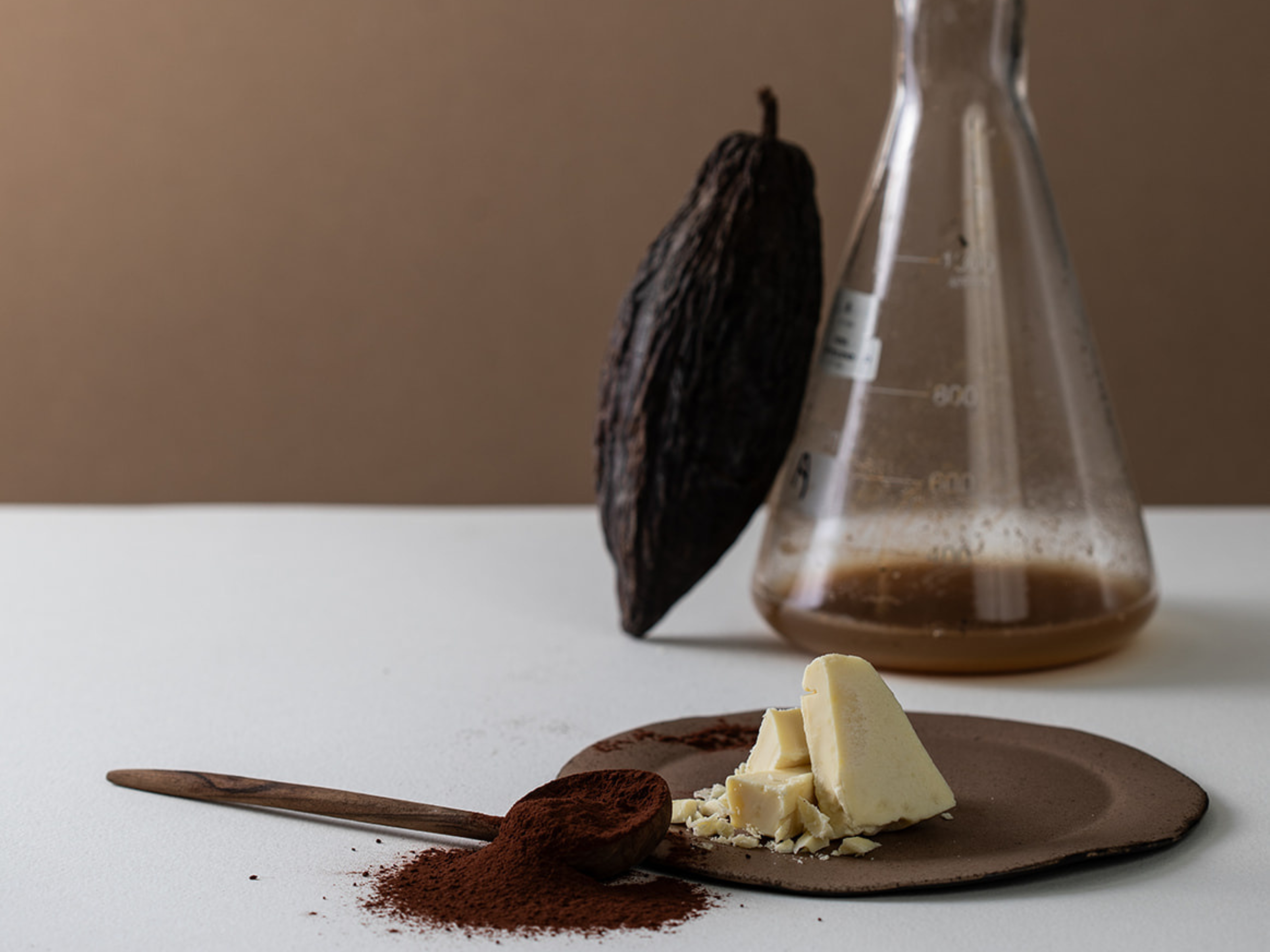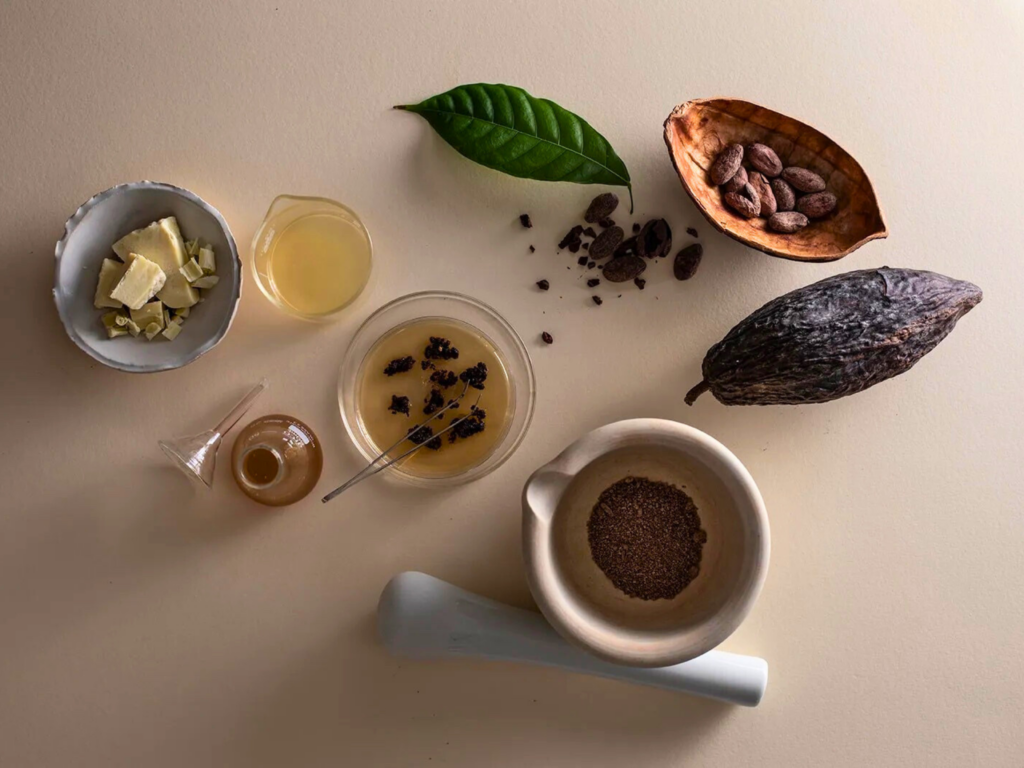
Israeli food tech startup Celleste Bio has developed a cell-based chocolate-grade cocoa butter at an EU-backed innovation event in Brussels.
Celleste Bio has unveiled a first-of-a-kind innovation to address the climate change-induced supply crisis hampering the chocolate industry.
The Tel Aviv-based firm has created cocoa butter from plant cell culture technology, showcasing the chocolate-grade innovation at EIT Food’s Next Bite Summit in Brussels.
The company, whose list of investors includes Cadbury and Oreo maker Mondelēz International, developed the fat using real cocoa cells, which were grown in suspension in a bioreactor. The process takes one to two beans to produce the same amount of cocoa butter that traditionally requires four tonnes of cocoa and 10,000 sq m of land.
“Our ability to produce real cocoa butter via cell culture proves that science can be used to grow and produce ingredients that mirror nature with integrity and transparency,” says Celleste Bio CEO Michal Berresi Golomb.
“The cocoa butter is made from the cells that are grown with vitamins, minerals, water, sugar and other key ingredients. The end product is pure cocoa butter, like you would get directly from the bean,” she tells Green Queen, confirming that there are no additional ingredients.
The innovation comes as the chocolate industry struggles to cope with climate change and rising demand. Extreme weather events have decimated cocoa yields in West Africa, home to the two largest producers of cocoa, and scientists have warned that a third of all cocoa trees might die out by 2050. Supply shortages have pushed cocoa prices to all-time highs,
Chocolate production itself is a major driver of climate change, producing more greenhouse gases than any other food bar beef, and being the source of widespread deforestation and food waste.
How Celleste Bio makes its cell-based cocoa butter

Founded in 2022 by Hanne Volpin, Orna Harel, Avishay Levy and Daphna Michaeli, with support from The Trendlines Group, Celleste Bio pairs agtech and biotech with computational AI to produce cocoa ingredients via cell culture.
“We select beans, different varietals, from our ‘bank’ and extract the cocoa cells. We then put them in a bioreactor – think a beer or wine tank – and grow them with vitamins, minerals, water and sugar,” explains Berresi Golomb.
“This then becomes a biomass where we can extract the butter and powder. So it’s very similar to how cocoa is produced in nature, but it is in a controlled setting, [with] optimal conditions, and checked for quality and consistency every step of the way.”
“The other important part is that the cells keep growing after we remove biomass, so the process repeats itself without having to use another bean. This means we don’t have to be finding more pods and cutting down more trees,” she says.
According to Celleste Bio, chocolate manufacturers spend about $16B on cocoa ingredients a year, and cocoa butter alone makes up nearly half of that outlay. And while crop yields and prices can level out at certain points, long-term instability is almost a guarantee without tech-forward solutions.
Howard Yano Shapiro, former chief agriculture officer at chocolate giant Mars, notes that technology “doesn’t replace traditional farming”, but acts as an “insurance policy” against supply chain shocks.
“Celleste Bio is one example of a technology that is getting ahead of a long-term crisis,” he says. “Cocoa butter is the single most important, expensive and resource-intensive ingredient in chocolate – and if we’ve learned anything from last year, it’s that solutions for crop supplementation are crucial.”
Celleste Bio eyes approval in four markets, targets 2027 launch

Celleste Bio’s ingredient is described as chemically and functionally bioidentical to conventional cocoa butter, with the same fatty acid profile essential for producing chocolate. In addition, it matches sensory qualities like the melting point, the smooth texture, and the ‘snap’ characteristic of a premium chocolate bar.
The cell-based cocoa fat has been designed to be scaled up and produced in a stable and sustainable manner, without any agricultural limitations. As a bonus, the company claims the process generates zero waste, as all inputs are used efficiently.
“We are about to finalise our pilot facility that will give us the [fermentation] capacity to produce at 1,000 litres, and we anticipate being market-ready by 2027,” says Berresi Golomb, adding: “We are currently in the regulatory process in the US, the EU, the UK and Israel.”
Its commercialisation efforts will be helped by the $4.5M it secured in funding last year, taking its total raised to $5.6M. Mondelēz International has twice invested in the startup and is a strategic design partner that will help it get closer to market. Celleste Bio is also in talks with “many chocolate manufacturers interested in cocoa supply chain solutions”.
One crucial aspect would be the price of the ingredient, as the cost of cocoa is what’s driving the industry towards food tech solutions. “The ingredient is and must be at parity with cocoa prices, ideally more cost-efficient when traditional cocoa supply is skyrocketing,” she says.
“We have two parts of the business: a drop-in replacement, which will be more on par with market costs; and premium cocoa, which will be priced for the premium market.”
Celleste Bio is one of several firms working with cell-based cocoa. California Cultured supplies its Flavanol Cocoa Powder to Japanese chocolate giant Meiji as part of a decade-long deal, and filed a cell-based cocoa butter patent earlier this year.
Fellow Israeli startup Kokomodo is developing cell-cultured cocoa powder and butter, and was acquired by publicly listed cellular agriculture firm Pluri in January. In Switzerland, Food Brewer is creating cell-based chocolate, backed by local chocolate major Felchlin. Finnish food conglomerate Fazer is also exploring cell-based cocoa.
The post Mondelēz-Backed Startup Unveils Cell-Based Cocoa Butter for Chocolate Industry appeared first on Green Queen.
This post was originally published on Green Queen.